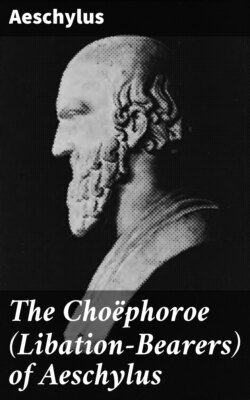The Choëphoroe (Libation-Bearers) of Aeschylus

Реклама. ООО «ЛитРес», ИНН: 7719571260.
Оглавление
Aeschylus. The Choëphoroe (Libation-Bearers) of Aeschylus
The Choëphoroe (Libation-Bearers) of Aeschylus
Table of Contents
Preface
PREFACE
Characters
The Choëphoroe
THE CHOËPHOROE
Footnote
Отрывок из книги
Aeschylus
Published by Good Press, 2021
.....
The date of Sophocles' play is unknown. But the Choëphoroe was produced in 458 B.C., and Euripides' Electra in 413. The forty-five years that separate them were years of very rapid artistic development. The Choëphoroe has both an archaic beauty and a stark grimness of speech which divide it from its two companions. There are fewer details, and attention is never long distracted from the central horror. At point after point of the action it is easy to show how the two later poets refined and developed the plain lines of Aeschylus, and exerted themselves to make the story more human and more probable. The comparison tempts one to reflect how little such technical improvements really matter, and how dangerously near to nothingness, in the last resort, are the ingenuities of realism. This play produces its illusion quite sufficiently by its mere grandeur and intensity. Yet, judged on its own archaic level, it shows remarkable skill in construction, just as, amid its story of relentless revenge, it conveys a great sense of compassion. The prologue itself is very skilful. With the last lines of the Agamemnon still ringing in our minds we see, as the play opens, a young man standing with shorn hair beside a grave mound; and half the story is told in a flash. Nor, apart from the marvellous invocation scene itself, would it be easy to find in Greek drama another play with such varied moments as the prayer of Electra, the entry of the poor, loving, half-ridiculous Nurse, the sudden onrush of the single terrified slave calling for help to the Women's House; above all, the amazing scene at the end with the blood-stained robe, the gathering of the unseen Furies, the last struggle of Orestes' reason, and the flight of the would-be Saviour as one Accursed, never to rest again. The final words of the Chorus ask the question which is to be answered, or at least attempted, in the Eumenides.
G. M.
.....